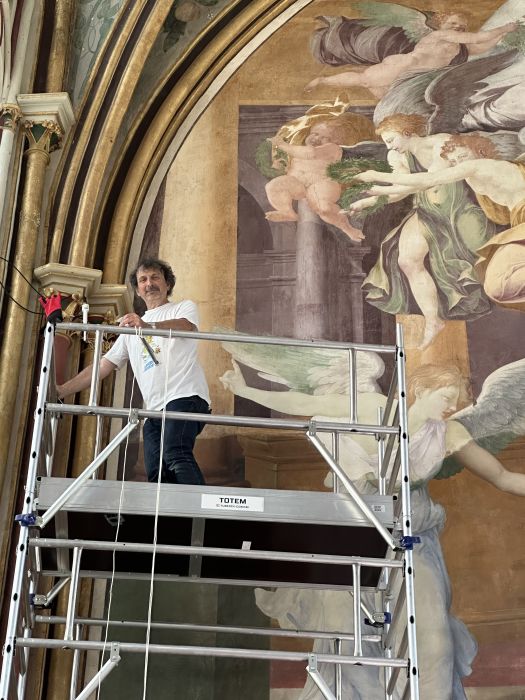


Overview
The Royal Chapel of Chaalis Abbey—often referred to as the “French Sistine Chapel”—is a treasure trove of French pictorial heritage. Built during the reign of Saint-Louis (Louis IX), it was magnificently frescoed by the Italian master Primaticcio from 1545 onwards. The frescoes and the monumental Annunciation on the counter-façade form an exceptional artistic ensemble. However, over the years, humidity has degraded these artistic treasures, threatening their integrity.
The Challenge
Despite previous restorations in the 19th century and in 2006, which have restored the frescoes to their former glory, problems of excessive humidity persist, exposing the paintings to a continuing risk of deterioration. In 2023, the Institut de France, owner of the Chaalis estate, undertook a project to restore this historic building to its previous splendor. One of the main challenges was to gain a detailed understanding of the thermo-hygrometric conditions inside the chapel, particularly at the interfaces between the painted walls and the atmosphere, to better prepare the remediation.
The Solution
Campbell Scientific collaborated with GECONSEIL, in partnership with ADTN, to meet the complex challenge of monitoring these thermo-hygrometric conditions. This collaboration resulted in the implementation of a metrological monitoring system to comprehensively document conditions inside the Royal Chapel of Chaalis.
The solution included the following Campbell Scientific elements:
- A CR1000X Measurement and Control Datalogger to collect and store data, ensuring meticulous monitoring of the chapel's internal conditions
- HMP155A-L Air Temperature and Relative Humidity Sensors to monitor atmospheric conditions, contributing to a better understanding of thermo-hygrometric variations
- CS241 Pt-1000 Class A, Back-of-Module Temperature Sensors to measure temperatures on the surface of painted walls, essential for identifying areas at risk
- A 4G modem for real-time data transmission, enabling continuous monitoring of the chapel's environmental conditions
The Benefits
The implemented metrological monitoring system provides these benefits:
- In-depth documentation of environmental conditions inside the Royal Chapel of Chaalis
- Precise identification of factors contributing to excessive humidity problems
- Real-time monitoring of thermo-hygrometric developments for a better understanding of ongoing phenomena
- Preparation of a targeted remediation strategy to preserve the exceptional artistic heritage
- Contribution to the long-term preservation of the Royal Chapel, ensuring its continuity for future generations
A comprehensive training program that reinforced the expertise of the stakeholders involved in the preservation of the Royal Chapel of Chaalis complemented this project. Because of this metrological approach, the Royal Chapel has benefited from real-time monitoring and an in-depth understanding of its thermo-hygrometric conditions, helping to preserve this precious cultural heritage for future generations.
Case Study Summary
Application
Preservation and restoration of a significant cultural and artistic heritage siteLocation
Chaalis, FranceProducts Used
CS241 HMP155A-L CR1000XParticipating Organisations
Institut de France, GECONSEIL, ADTNMeasured Parameters
Temperature, humidity, surface temperatureView the PDF